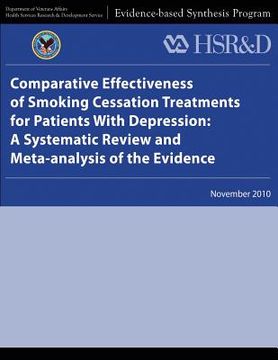Comparative Effectiveness of Smoking Cessation Treatments for Patients With Depression: A Systematic Review and Meta-analysis of the Evidence (en Inglés)
Reseña del libro "Comparative Effectiveness of Smoking Cessation Treatments for Patients With Depression: A Systematic Review and Meta-analysis of the Evidence (en Inglés)"
Tobacco smoking is the single greatest preventable cause of disease in the U.S. Half of all American smokers who fail to quit will die of a smoking-related illness. Cigarette use is higher among Americans with depression than in the general U.S. population. Persons with depression are about twice as likely (45% versus 22%) to be current smokers than are individuals who are not depressed, and smokers are more likely to have a history of depression. Moreover, veterans have higher rates of depression and smoking compared to the general population. Several hypotheses have been offered to explicate the association between smoking and depression, including mood-enhancing effects of nicotine and common genetic and environmental factors. Depression also appears to be an important factor in smoking cessation. Smokers who are depressed are more likely to relapse from a quit attempt, have higher nicotine dependence, suffer negative mood symptoms from withdrawal, and suffer greater smoking-related morbidity and mortality than the general population of smokers. Smokers with depression are highly motivated to quit smoking. One study found that 79% of smokers with depression intended to quit, with 24% ready to make a quit attempt in the next month. Despite the complex relationship between tobacco use and depression, smokers with depression should be offered cessation services. Several evidence-based smoking cessation intervention strategies exist for the general population of smokers. All forms of nicotine replacement therapy (NRT) (e.g., gum, transdermal patch, inhaler, lozenges) augment successful quit attempts, increasing quit rates by as much as 50 to 70%.35 Also, use of some antidepressants (i.e., bupropion, nortriptyline) can double the chances of smoking cessation, and this effect seems independent of the antidepressive effects of these medications. For behavioral interventions, there is a strong dose-response relationship between treatment intensity and smoking cessation rates. More intensive interventions, measured by total contact time, are associated with increased abstinence rates. For example, smoking cessation counseling improves quit attempts over self-help aids and other less intensive therapies. Combining behavioral interventions with pharmacotherapy increases quit attempts over each therapy delivered alone and is considered the gold standard of care for effective smoking cessation treatment. We conducted a systematic review of the peer-reviewed literature to answer the following key questions: Key Question 1: For patients with a history of a depressive disorder or current significant depressive symptoms, what is the comparative effectiveness of different smoking cessation strategies on smoking abstinence rates? Key Question 2: For patients with a history of a depressive disorder or current significant depressive symptoms, are there differential effects of smoking cessation strategies by depression status (i.e., history of MDD, current depressive symptoms, current MDD)? Key Question 3: For patients with a history of a depressive disorder or current significant depressive symptoms, are there differential effects of smoking cessation strategies by gender? Key Question 4: For patients with a history of a depressive disorder or current significant depressive symptoms, does treatment effectiveness differ by whether smoking cessation/depression treatments are delivered concurrently or sequentially? Key Question 5: What is the nature and frequency of adverse effects of smoking cessation treatments in patients with a history of a depressive disorder or current significant depressive symptoms?

